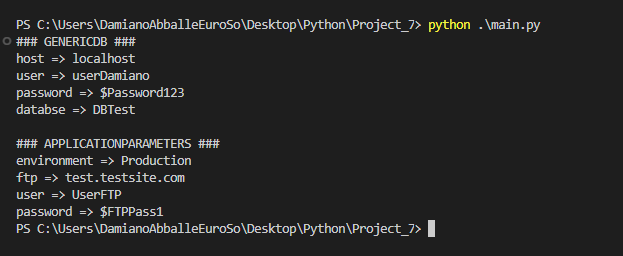In this post, we will see how to read a Configuration file that we usually use in our projects.
As we know, a Configuration file is used to store key value pairs or some configurable information that we could need in our projects. A config file is very useful because, if we need to change a value, we should just to modify the file without touching our code.
It is possible to use many formats to define a Configuration file but, in this post, we will see maybe the most used format: INI.
We start creating a file called settings.ini where, we will insert some parameters for a generic DB and other generic parameters:
[GenericDB]
host = localhost
user = userDamiano
password = $Password123
db = DBTest
[ApplicationParameters]
environment = Production
ftp = test.testsite.com
user = UserFTP
password = $FTPPass1
Then, we create a file called main.py used to read the settings.ini file:
1 2 3 4 5 6 7 8 9 10 11 12 13 14 15 16 17 18 19 20 21 22 23 24 25 26 27 28 29 30 31 32 33 | # importing the module used to read a config fileimport configparser# definition of the object used to read the fileobjConfigFile = configparser.ConfigParser()objConfigFile.read("settings.ini")# definition of variables used to read the GenericDB sectionobjGenericDB = objConfigFile["GenericDB"]host = objGenericDB["host"]userDb = objGenericDB["user"]passwordDb = objGenericDB["password"]database = objGenericDB["db"]# definition of variables used to read the ApplicationParameters sectionobjApplicationParameters = objConfigFile["ApplicationParameters"]environment = objApplicationParameters["environment"]ftp = objApplicationParameters["ftp"]user = objApplicationParameters["user"]password = objApplicationParameters["password"]# printing the parametersprint("### GENERICDB ###")print(f"host => {host}")print(f"user => {userDb}")print(f"password => {passwordDb}")print(f"databse => {database}")print()print("### APPLICATIONPARAMETERS ###")print(f"environment => {environment}")print(f"ftp => {ftp}")print(f"user => {user}")print(f"password => {password}") |
We have done and now, if we run the application, this will be the result:
